Ridiculous/Hilarious/Terrible/Cool (20 page)
Read Ridiculous/Hilarious/Terrible/Cool Online
Authors: Elisha Cooper

That afternoon up at Montrose, a turf field next to the lake, the clouds from earlier in the day have darkened and dropped. A cool spring rain blows sideways. Fans lean into umbrellas, and second-stringers peer out from under warm-up hoods. The game is a mess, everyone bunching on the side of the field where the wind has blown the ball, as if the players were food that had slid to one side of a plate.
Weather is an equalizer, but Emily refuses to be equaled. As much as she appears not to run, she may be hustling more than anyone. Side to side, end to end, repositioning herself constantly. Other players let the ball slip away from their feet, but not Emily. At the end of the half she settles the ball, glances up, then drives a pass over the Lincoln defense to her sister, who puts the ball into the back of the net.
As her teammates hug, Emily lingers behind. Hands on hips, white jersey stuck to her front and billowing out from her back like a sail, squinting through the downpour.
Nice try, rain.
Maya walks up the atrium stairs slowly, as if the stairs were a mountain and she were low on oxygen. She was out of school for three weeks.
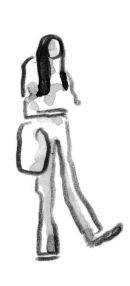
“It was the worst experience of my life,” she moans, taking one more step. “I just lay there. It was so boring. It was the grossest thing ever. My throat was almost completely swollen shut.”
She started feeling unwell before her NYU audition. But she kept telling herself,
I cannot get sick. I cannot get sick
. So she did not get sick, and her audition went great. But she knew she was pushing herself too hard, spending too much time with Ben, revving high in a low gear.
I cannot get sick. I cannot get sick
. So she did not get sick, and her audition went great. But she knew she was pushing herself too hard, spending too much time with Ben, revving high in a low gear.
“There wasn't any time for me to calm down.”
The afternoon after her audition Maya felt a bump on one side of her throat. An hour later she felt a bump on the other side. When she opened her mouth it was coated with whitish gunk. She called her sister, who's a doctor, and the next day went to her own doctor and was told she had mono. That night she crashed.
The first week was dreadful. She'd wake up late, her swollen neck as wide as her head. After popping some ibuprofen she'd watch
Oprah,
then
The View,
then the view out her window of the lake. Sailboats and bicyclists, the world blossoming, with her stuck up on the twenty-sixth floor, as miserable as she had even been. In the afternoon she napped. When she woke she read monologues from Spalding Gray, which were depressing because Gray ended up drowning himself. Then she'd shower and change into new pajamas.
Oprah,
then
The View,
then the view out her window of the lake. Sailboats and bicyclists, the world blossoming, with her stuck up on the twenty-sixth floor, as miserable as she had even been. In the afternoon she napped. When she woke she read monologues from Spalding Gray, which were depressing because Gray ended up drowning himself. Then she'd shower and change into new pajamas.
One afternoon, Maya got a letter. It was an invitation to a party for incoming freshmen at NYU's Tisch School of the Arts. This was odd. Maya hadn't been accepted at NYU. After checking online, it appeared she had been. It was exciting, in a backward sort of way. Being accepted was a huge honor since, as Maya knows, Tisch is one of the best acting schools in the country. Maya was thrilled, though it was hard to smile with a
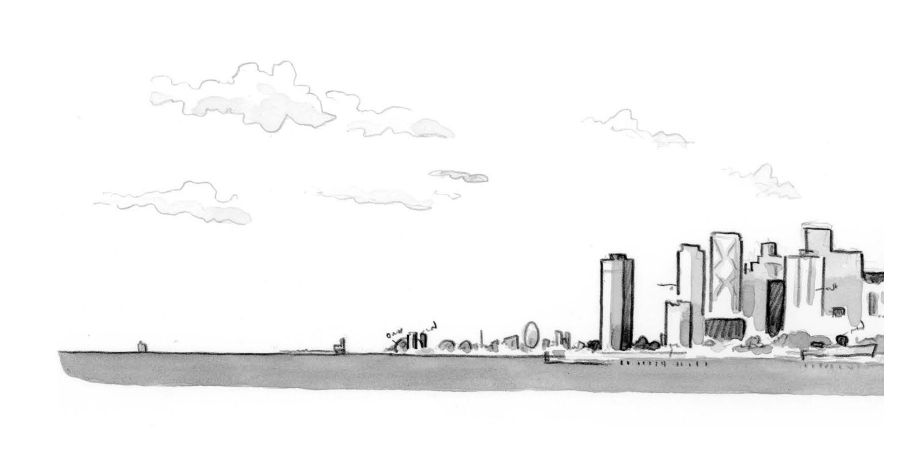 throat coated in pus. After three weeks of lying around in her pajamas, she came back to school.
throat coated in pus. After three weeks of lying around in her pajamas, she came back to school.

“I could go to sleep right now,” Maya whispers, slumping on the bench outside the recital hall. She still feels sluggish. When she was in the depths of mono, Ben brought her a smoothie (one with echinacea that burned her throat), but now that she's back he thinks that because she looks fine she is fine, which she is not. This has caused tension between the two of them. He expects more, but Maya doesn't have it in her to give.
“It's hard,” Maya says, voice fading in and out, “to make excuses.”

Mr. Dyson, the physics teacher, is in his patient teacher mode. He's rubbing the top of his bald head.
“We're prepared, almost,” he says, staring directly into the eyes of each of the students in his Zulu seminar. His own eyes are bloodshot.
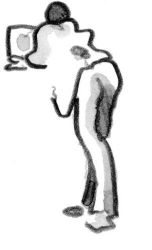
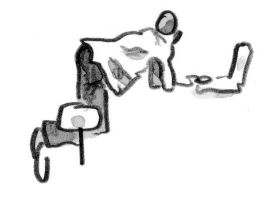
These last months, when not learning Zulu, the seminar has been planning a spring break trip to South Africa, an exchange with a high school in Durban. It's taken a huge amount of work. Every week the seminar becomes a room of travel agents (checking tickets online), fund-raisers (writing letters to Oprah and other institutions asking for money), or U.N. diplomats (making presentations in Zulu and PowerPoint).
“Do you all have your malaria meds?” Mr. Dyson asks, voice rising to be heard over the beat of Skwatta Kamp's
“Washumkhukhu”
playing in the background.
“Washumkhukhu”
playing in the background.
“Yebo!”
the students shout.
“Yebo!”
the students shout.
“Yebo!”
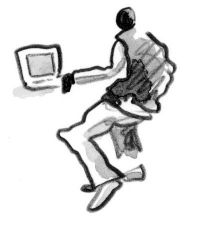
The students fly to South Africa next week. On Mr. Dyson's desk is a stuffed cat. Students walking into the seminar give the cat a tap for luck.
Diana looks strained, her face tight. It's her free period and she's sitting outside the girls' bathroom on the first floor, holding a copy of Chinua Achebe's
Things Fall Apart
. She's rubbing her hands over the book cover and smoothing its edges. She's not smiling. She feels everything in her life crept up on her and smacked her on the back of the head.
Things Fall Apart
. She's rubbing her hands over the book cover and smoothing its edges. She's not smiling. She feels everything in her life crept up on her and smacked her on the back of the head.
“It didn't hit me until now,” she says. “Home and stuff.”
Her brother pled guilty. Soon he'll be transferred out of Cook County Jail, serve three months at a detention facility, then return home. This is some relief, since he could have received a two-year sentence. The girlfriend of the police informant, on whose word the case depended, never showed up in court. Diana's brother was able to plead to a reduced charge. Another relief was that some other inmates escaped from jail and asked Diana's brother to join them but he said no. Their escape, and capture, have been all over the Chicago papers.
That's the one thing Diana does not blame her brother for. She blames him for everything else. She blames him for not having a job. She blames him for the big tattoos covering his arms, which make him look like a gang member. She blames him for hanging out on the street all day doing nothing.
“What did he expect?”
It's possible he'll be able to come to Diana's graduation. It's possible he won't. The general uncertainty makes life difficult. Like when her brother's boy comes to the Martinez house and everyone has to tell him that Daddy is at school. Though even something difficult has an upside. Diana loves having her nephew around.
“Oh,
ye-eh-es
. It's nice,” she says, smiling for the first time today. Her eyes are watering.
ye-eh-es
. It's nice,” she says, smiling for the first time today. Her eyes are watering.
Diana has been sick all week. She can't shake her cold, or her irritation. Even the good things in her life have been upsetting her. Her father is taking his U.S. citizenship exam, and she's had to spend a lot of time helping him study. Her younger brother started swimming, but the other day he didn't want to go to the pool and she had to drag him there.
“I explained to him, âYou get used to it.'”
Despite the many demands on Diana, one thing has made life easier. Scholarships have been pouring in: a Hispanic scholarship, a President's Award, a thousand dollars here, a thousand dollars there. The family share of Diana's tuition at the University of Illinois could be as low as twenty-eight dollars. It's gratifying, though sometimes it's hard to appreciate good news if everything else around you seems to be falling apart or dragging you down or holding you back.
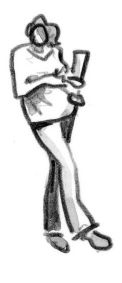
Other books
Ideal Marriage by Helen Bianchin
Closing The Gap (Dangerous Pasts, #1) by Colleen Charles
Bebe by Phelps, Darla
Charming Billy by Alice McDermott
Salvage for the Saint by Leslie Charteris
As Midnight Loves the Moon by Beth D. Carter
The China Governess by Margery Allingham
The Thirteen Gun Salute by Patrick O'Brian
Falling In by Hopkins, Andrea